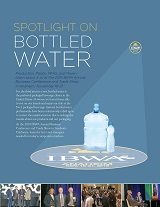A tax on bottled water has been proposed in Hawaii, similar to one that was implemented last year in Chicago.
These taxes single out an industry that is healthy, safe and provides consumers with a choice over many unhealthy beverages.
Hawaii calls its proposed tax a 5-cents-per-container “surcharge” on bottled water produced or distributed in-state.
The tax will add $1.20 to every case of bottled water sold on the islands, resulting in a cost increase of 30 percent on a $3.99 case. This tax is regressive and will place an unfair burden on those who can least afford it: the state’s low and fixed-income citizens, including the elderly.
Food products in the State, including bottled water, are already taxed at least 4 percent under state’s general excise tax. Hawaii State law also allows localities to apply a “tax on tax” beyond the four percent rate. The bottled water tax proposed in HB 3445 further burdens consumers already subjected to Hawaii’s broad-based general excise tax.
This narrowly focused, punitive tax will make it more difficult for consumers to drink bottled water, and that is not in the public interest.
Levying a special tax on a healthy beverage such as bottled water could cause consumers to purchase other, less healthful, alternatives. Consumers must be able to choose the healthful benefits of bottled water consumption without added cost and measures that penalize smart beverage choices.
The discriminatory bottled water tax unfairly targets the bottled water industry, which is already paying its fair share of business and other taxes in Hawaii. Kenneth Simon, president of Menehune Water Co. Inc., nicely summarizes the points against a tax in his column at HawaiiReporter.com.
Production and distribution of bottled water plays an integral role in Hawaii’s economy, and this tax will harm the ability of local companies to compete on a level playing field in a highly competitive industry. It will harm local businesses, their employees, their suppliers and their retail customers. In the long run, a bottled water tax will increase the price of groceries, which could cause an overall decline in retail sales. That could ultimately lead to a reduction in jobs as production demands decrease.
Specific to Hawaii, the bottled water tax is also discriminatory in that it would require the bottled water industry to foot the entire bill for new state funds to pay for wetlands protection and programs to fight invasive species.
While the bottled water industry supports these initiatives in concept, it should not be held solely responsible for funding efforts to alleviate problems that it has not caused directly.
In reference to HB 3445’s preamble, the bottled water industry does not disparage municipal water supplies. In fact, approximately 25 percent of bottled water initially comes from municipal water supplies before it is further purified and then bottled. The bottled water industry therefore actively supports and is involved in maintenance of those municipal water supplies and their related infrastructures.
To single out bottled water from other food products – not to mention thousands of other consumer products that use water as an ingredient or in production – will not further the sustainability of water resources and is not in the best interest of consumers.
Locally, the bottled water industry supports the efforts of Hawaii-based recycling organizations such as Recycle Hawaii, Earth-Friendly Schools Hawaii, and Oahu Community Recycling, and welcomes opportunities to be involved with those organizations. These efforts are good for the environment, and good for business.



























